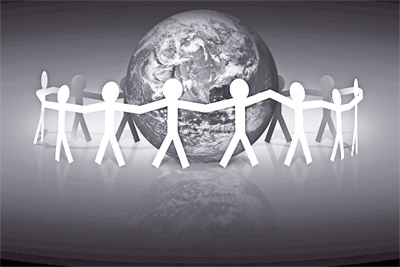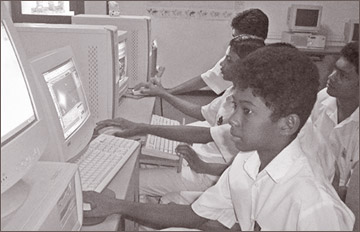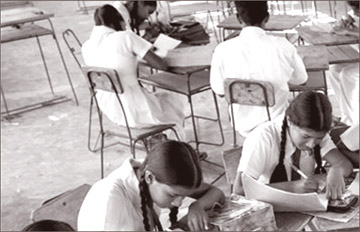Remapping the future with innovative education
By Lionel WIJESIRI
The National Action Plan on Education for Peace and Sustainable
Development was launched by President Mahinda Rajapaksa recently. The
Action Plan has been formulated by the Education Ministry in
collaboration with UNESCO, based on the United Nations’ Decade for
Education for Sustainable Development.
 |
|
Towards a sustainable
world in the future |
This article discusses an aspect of the Action Plan: Sustainable
development.
What does education for a sustainable future really mean? According
to UNESCO’s vision of education for the 21st century, it means; the
education system should prepare students to enter the workforce as well
as handle a crisis, be resilient, become responsible citizens, adapt to
change, recognise and solve local problems with global roots, meet other
cultures with respect, and create a peaceful and sustainable society.
Learning should be about knowledge and also about working and
interacting with others to live in the changing world. Learning should
be enjoyable, hands on and relevant to life outside school. Every person
should benefit from genuine learning opportunities throughout life, in
the workplace and within the community.
Every person should benefit from an education promoting development
that is environmentally sound, socially equitable, culturally sensitive
and economically just. This vision is infused in the Government Action
Plan.
Sustainability is a complex idea. The process of sustainable decision
making involves a critical examination of our priorities, habits,
beliefs, and values. The challenge is that it must be a collaborative
process - citizens need to agree upon the vision as well as an action
plan for the future initiated by the Government. This requires
collective and conscious decision-making and is the heart of Education
for a Sustainable Future.
Sustainable development
At the 1992 Earth Summit in Rio de Janeiro, Brazil, the role of
education in promoting sustainable development was made explicit by what
is known as Agenda 21, the global action plan for the 21st century. It
said: “Education ... should be recognised as a process by which human
beings and societies can reach their fullest potential. Education is
critical for promoting sustainable development and improving the
capacity of the people to address the environment and development
issues”.
The signatories of the Rio Summit agreed that education for
sustainable development is a holistic approach for a school's overall
curriculum, not a separate subject. It requires reflection on what to
teach and how to teach to encourage students to reflect and debate
issues to enable them to form their own opinions.
Our education process should contribute to three axes of sustainable
development, namely the social, economic and environmental dimensions.
However, there is an information gap on how the concept of education for
sustainable development could be translated into practices at national
level.
It is in this context, I believe, that the concept of innovation
plays a major role. There are several types of innovations we can think
of. We can introduce innovative topics in the curriculum to be addressed
at national level: Issues such as effects of globalisation to healthier
lifestyles, to efficient energy consumption and promotion of renewable
energy. We can innovate ways to forge multi-stakeholder approaches and
to create a sense of ownership among students, families, teachers and
decision-makers.
 |
|
The use of technology
such as the Internet should be promoted |
The innovative ways of delivering the educational process could be by
promoting interactive learning approaches and the use of new technology
such as the Internet. We can innovate in forging new partnerships and
networks for the purpose of sharing knowledge and experience, fostering
communication and exchange of experiences.
In the curriculum we can also focus on ensuring a strong
inter-disciplinary approach in addressing the inter-related social,
economic and environmental dimensions of sustainable development.
Even though all education and training activities have the potential
to reinforce sustainable development, it is acknowledged that to fully
realise this potential, education activities, especially focused on
sustainable development, are required. We should understand that
education for sustainable development is a lifelong process from early
childhood to higher and adult education and goes beyond formal
education. As values, lifestyles and attitudes are established from an
early age, the role of education is of particular importance for
children. Since learning takes place as we take on different roles in
our lives, Education for Sustainable Development has to be considered as
a “life-wide” process.
Life practices
For students to make informed decisions and embrace life practices
that demonstrate an understanding of and belief in sustainability, they
require particular knowledge, skills, values and life practices. This
will enable them to take personal responsibility for a sustainable
future and work towards an equitable quality of life for all. They can
think critically about global issues and take action locally and
advocate a strong economy and for government policies that support a
strong economy.
Eventually, he/she will care about local, national and global issues,
be concerned about the future, demonstrate respect for the environment,
consume less; refuses, reduces, reuses, recycles, restores and
revitalises and make choices to contribute to the common good. Isn’t
this the type of citizen we need for tomorrow?
Future
Embedding sustainability themes within the curriculum and in the life
of the school develop our young people as global citizens and equip them
with skills, values and attributes for learning, life and work. It is
estimated that thousands of new jobs will be created in the green sector
in the next 10 years as Sri Lanka makes a transition to a low carbon
economy. Using sustainable development education as a context for
learning empowers learners to contribute to this process of change
within society and also helps them develop the skills required to access
exciting career opportunities in the green sector.
 |
|
Learning should be
about working and interacting with others |
If Sri Lanka is to realise its ambitions to move towards a low
carbon, zero-waste future and deliver on the commitments outlined in the
National Action Plan, it is also important that we promote effective
collaboration between all education sectors including schools, youth and
community learning and higher education.
Let us not lose sight of the fact that the young people of today are
the decision-makers of tomorrow and, therefore, should be encouraged to
research sustainability issues and to form and defend their opinions. In
doing so, they will develop the skills to engage in informed and
sustainable decision-making.
Let them understand that recent events are forcing our society to
collectively address sustainability: To think about the finite nature of
Earth’s resources; to understand that the damage we are inflicting on
our atmosphere may be irreparable; and to realise that our behaviour
needs to change if we are to sustain our quality of life in this
beautiful country.
Finally, let them also learn that all of us are responsible for our
personal future, for the future of our country and the world and that we
can make a difference.
|

